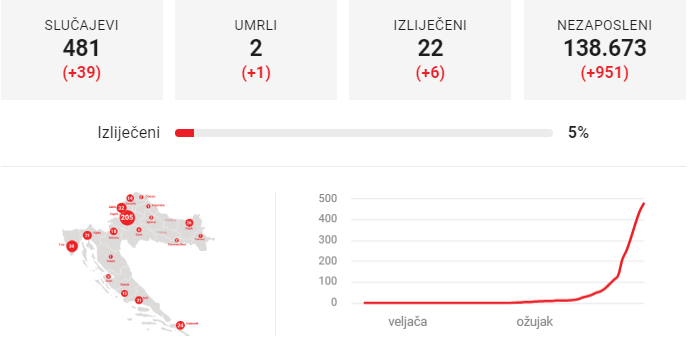PHOTOS: Shopping in Split One Week into Croatian Lockdown
March 27, 2020 - So, what is Split like one week into the Croatian "lockdown"? A closer look.
Last Thursday, March 20, the Croatian Civil Protection Headquarters announced the strictest measures yet in the fight against the coronavirus.
Restaurants, bars, and cafes were forced to close until at least April 19, parks are taped off, and you’ll notice police breaking up any gathering of more than a few people - especially if you’re not two meters apart.
The strict measures continued not even one week later, when the Civil Protection Headquarters announced restrictions on moving between cities, and citizens cannot leave their respective local government units, save for a few exceptions.
No, Croatia is not on total lockdown like Italy or Spain. We can still freely walk to the store and pharmacy (so long as we’re not in groups). Some of us are still setting out on solo walks in nature, while others are enjoying walks along the coast with their dogs. Depending on where you are, you may run into the police. We’re certainly urged to stay at home and to leave our homes only if necessary, which seems like Croatians are mostly adhering to.
Being the only one fit in my household to head out during these strange times, I documented my Split shopping experience one week after Croatia mostly shut down.
As you can see, the streets are empty - and I live in the Firule neighborhood right next to the hospital, which is usually bustling with grocery stores, bakeries, and cafe-goers.

Walking by the pharmacy, a line of 5 people waited outside, as only a few customers are allowed in at a time.
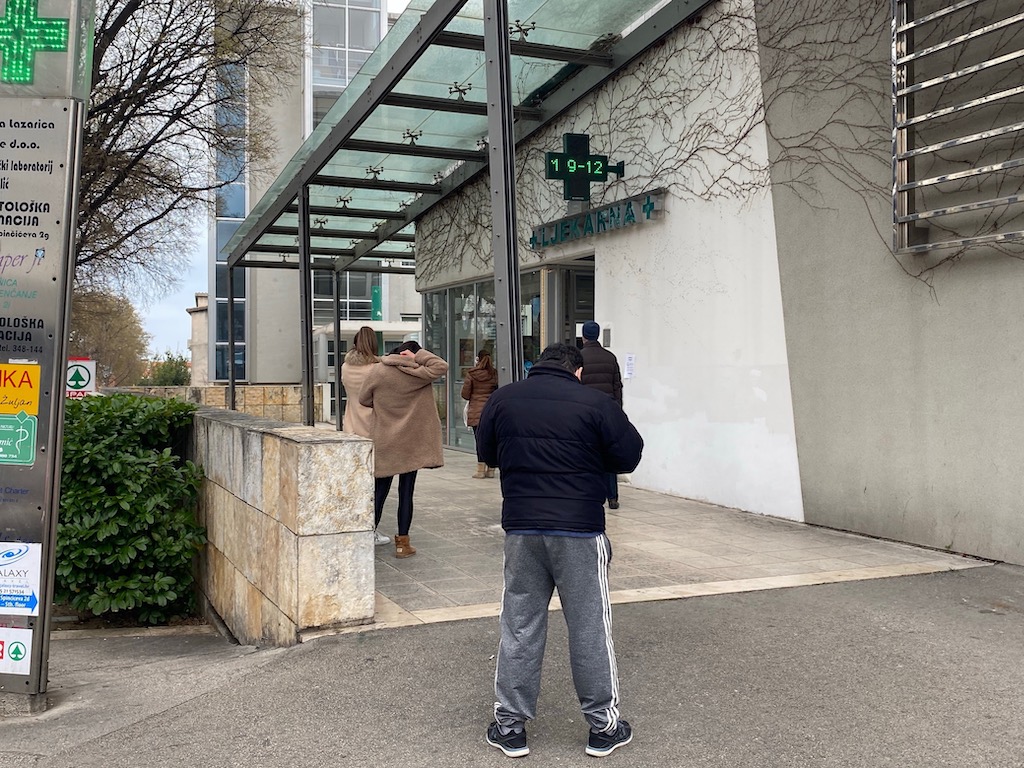
Onto Spar, where I did my shopping. The first thing I noticed: an ad offering help to neighbors in need, as we have seen circulating quite often in Croatia over the last week.
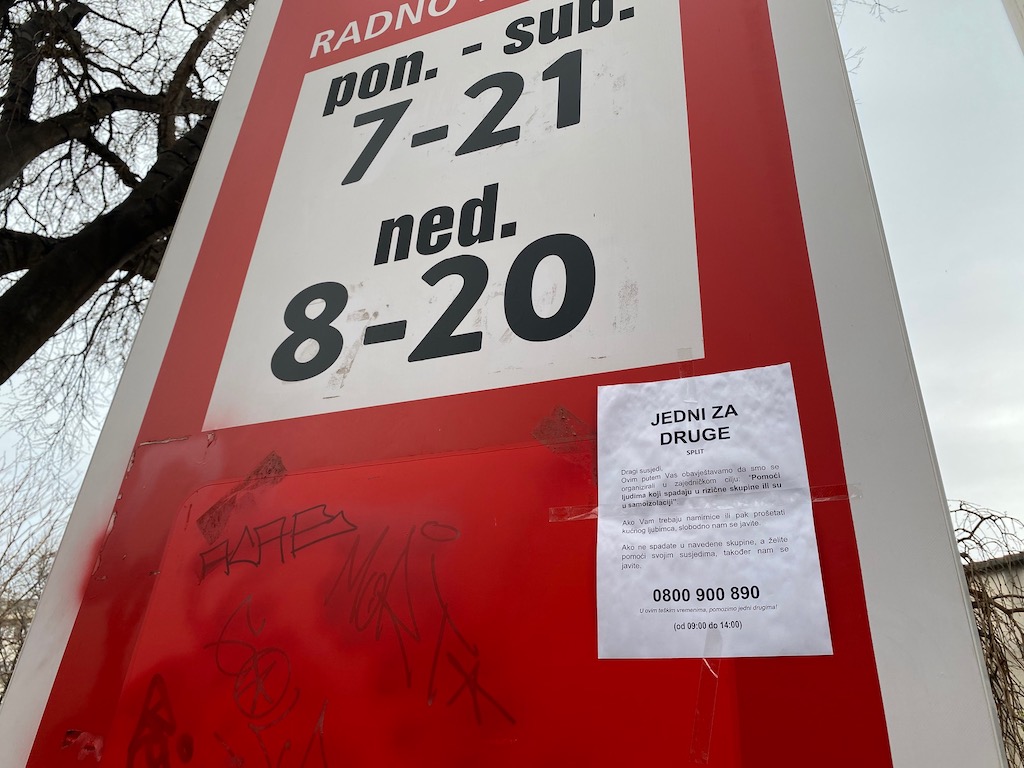
A Spar employee was parked at the entrance to the store, ushering shoppers in two at a time. I waited for about 8 minutes.
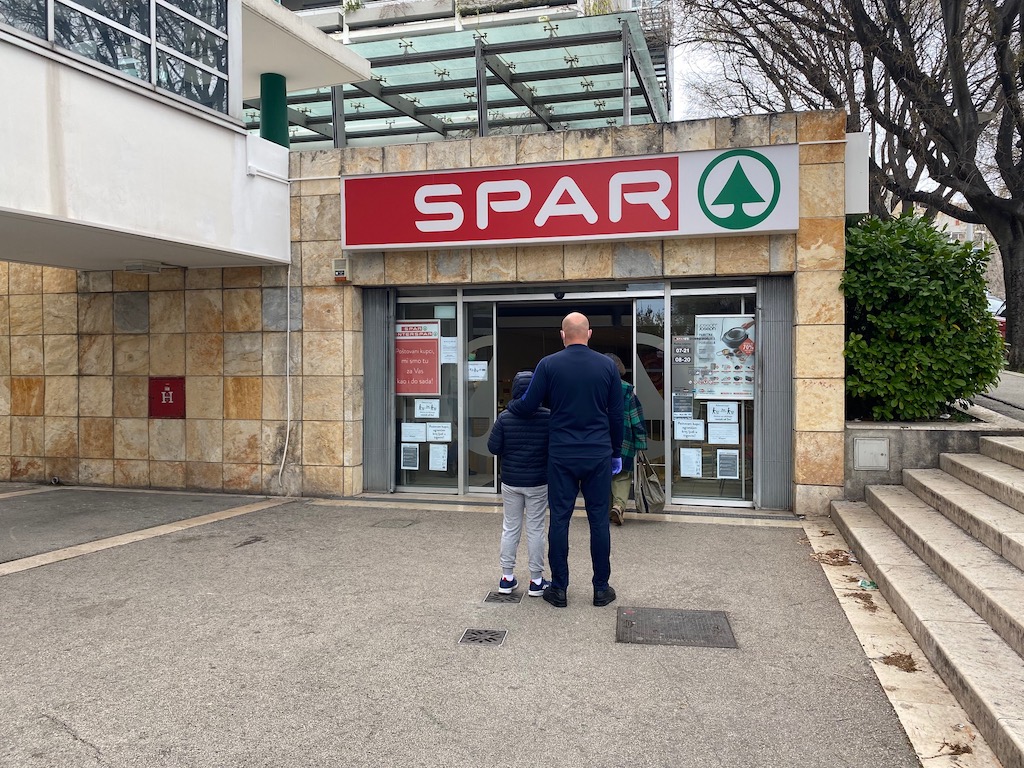
A sign on the door reads that only 35 shoppers can be inside the store at a time.
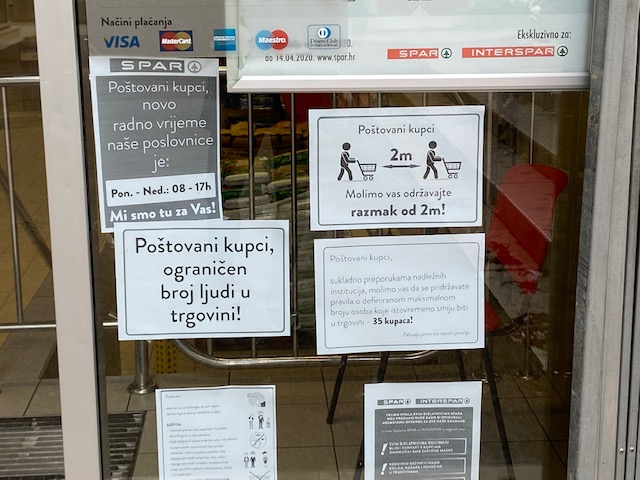
Spar itself was fully stocked, with enough toilet paper to carry us through the next few months.
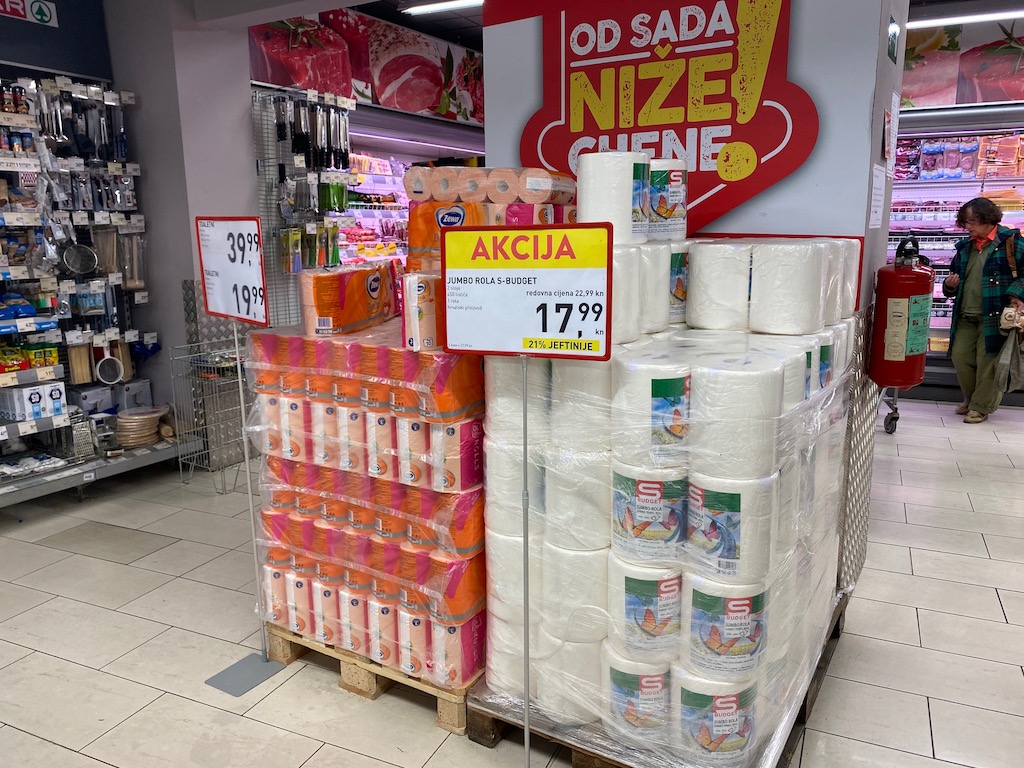
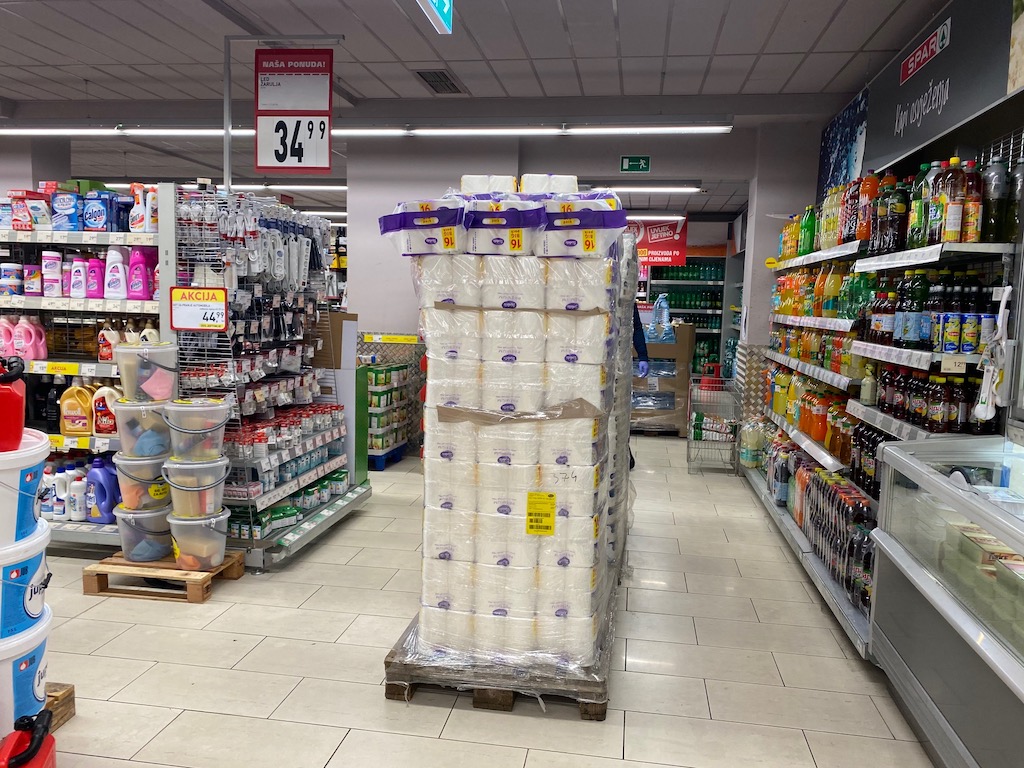
No shelf in the store was empty, with the meat panic buying of a few weeks before long gone.


Follow TCN's live updates on the coronavirus crisis in Croatia.
Oxford COVID-19 Government Response Tracker: Croatia Implementing Strictest Measures in World
March 27, 2020 - According to Oxford University, Croatia has the strictest coronavirus measures in the world.
Although some members of the Croatian Civil Protection Headquarters are dissatisfied with citizens' behavior and threatening even harsher measures, judging by the state measures tracker in the fight against the coronavirus, Croatia is currently implementing the most rigorous measures in the world, according to Oxford University.
Namely, British researchers are looking at basic criteria such as school closures, travel bans, and public gatherings bans, and then compares these measures to the number of people currently infected, thereby obtaining an index of the rigor of the measures implemented.
The purpose of the meter is to offer transparent insight into the measures taken by world governments to combat the coronavirus, and the published data will be updated frequently.
Judging by the coronavirus meter, Croatia is currently implementing the most rigorous measures in the world, with Serbia and Syria not far behind. Thus, it should be kept in mind that countries with few cases that responded quickly were highlighted.
Croatia closed schools, playgrounds, banned public gatherings, closed cafes, restaurants, and all shops that were not necessary very early on, and public transport was suspended. Croatia urges citizens to stay at home and some parts of the country, such as Murter, are quarantined.
While Croatia is at the top, some countries, such as the United States, where the infection is expected to explode, as well as the United Kingdom and Canada, are below the midline of austerity measures.
Health Minister Vili Beros commented on this analysis for RTL Danas, saying that Croatia is at the European top because of these measures.
"Our results so far show that we are among the countries that have slower growth in the number of patients. I think the measures are introduced on time and very carefully balanced. We have announced a certain reduction in these measures relating to shops around the markets that provide supplies because life should not and will not stop. We need to carefully balance the preservation of normal life flows and the possibility that the infection continues to spread," he said.
We also must remember, however, that the Oxford tracker does not have country-specific data such as India, which has become the world's largest quarantine. Namely, 1.3 billion people must stay in their homes, and the media is flooded with videos of the police attacking everyone who they find on the street.
You can see the Oxford Government Response Tracker here.
Source: Direkno.hr
Follow TCN’s live updates on the coronavirus crisis in Croatia.
PHOTO: Child from Nustar Draws Croatian Civil Protection Team as Superheroes
March 27, 2020 - Eight-year-old Simon Coric from Nustar delighted people across Croatia after a drawing of his superheroes went viral.
In the corona era, it’s clear that our superheroes have shifted from the usual Batman and Superman to healthcare workers and those on the streets keeping us safe - and in this case, it is the Croatian Civil Protection team.
Dnevnik.hr reports that one eight-year-old boy from Nustar, a small, eastern Croatian village not far from Vinkovci, could hardly hide his praise for the hard work of the Croatian Civil Protection team, who have become Croatian celebrities overnight thanks to their diligence and dedication to Croatian health and safety in the fight against the coronavirus.
The famous faces go unrecognized by no one today, as television screens flaunt them multiple times a day to keep us informed and prepared for whatever is next to come.
“Do you recognize these four? Eight-year-old Simon from Nustar says they are heroes to him!” Reads an announcement from the Nustar municipality with a photo of a boy proudly holding a drawing.
Namely, Simon Coric drew his favorite comic book superheroes: Superman, Batman, Flash, and Wonder Woman, but below them wrote the names of the Croatian Civil Protection Headquarters - Vili Beros, Krunoslav Capak, Davor Bozinovic, and Alemka Markotic. Below the figures, Simon used the hashtags #OstaniDoma, or #StayHome, encouraging people to do just that.
Health Minister Willi Beros saw the drawing and sent Simon a special message:
“'Dear Simon, thank you. Take care of your loved ones... You are their shield and my hero! Love, Vili,” Beros wrote from the official Facebook page koronavirus.hr.
In a time of uncertainty and panic, Simon's drawing and crucial message is a ray of sunshine that has undoubtedly won the hearts of the Croatian people.
Thank you, Simon, and thank you to the Croatian Civil Protection Headquarters!
Follow TCN's live updates on the coronavirus in Croatia.
Have Some Shops Raised Prices Despite Croatian Government Freeze?
We recently wrote about the Croatian Government's decision to freeze the prices of several sought-after products in the face of the coronavirus crisis, to make sure that the prices of those goods couldn't climb during the economic turmoil the virus' outbreak is causing to the domestic economy.
It seems, however, that despite the price freeze on products which can be found here, there is suspicion that some shops have still been hiking up the prices on those apparently ''frozen'' items.
As Poslovni Dnevnik writes on the 26th of March, 2020, the State Inspectorate has also received reports against employers for not adequately protecting their workers and keeping in line with the now very stringent measures put in place by the Croatian Government and the Civil Protection Headquarters.
Pursuant to the decision of the Croatian Government on extraordinary price control measures for certain products and the appropriate law which has now been introduced and officially came into force on March the 16th, 2020, inspectors from the State Inspectorate have been routinely performing inspections of entities engaged in the registered activity of production and trade.
According to N1, the State Inspectorate conducted 390 inspections of shops (commercial establishments) across the Republic of Croatia, and in 63 cases the facts were unfortunately established, and in 28 commercial entities there is a reasonable suspicion that a violation of the Croatian Government's price freeze on the products listed in the link provided above has occurred.
As mentioned, the State Inspectorate has also received concerning reports against employers for not properly protecting their workers against coronavirus. In regard to worker protection, 26 complaints have been received, 16 controls have been carried out so far, and four employers have been found not to have not been complying with the measures.
Make sure to follow our dedicated section for rolling information and updates in English on coronavirus in Croatia, as well as for lengthy articles by Croatian scientist and epidemiologist Igor Rudan.
Shopping Online in Coronavirus Isolation? Some Helpful Links
(Photo credit My Fit Station)
As Grazia writes on the 20th of March, 2020, many measures are currently circulating around about how best to take care of yourself and others during the coronavirus pandemic, and among them is to minimise going out, and if you can - to minimise going to buy groceries.
In order to do this and at the same time contribute to the development of the domestic economy, here are some useful Croatian platforms that offer online delivery, while at the same time in the range, among other things, offer products from Croatian OPGs and domestic products.
GARDEN (all of Croatia)
With over a decade of experience, Garden is also synonymous with organic food delivery to many. Garden's team is made up of experts on organic production, with one mission: to bring the highest quality eco products to every Croatian table at affordable prices for everyone.
"Our eco products have an environmental certificate that guarantees organic origin, including our own Garden and Superfood brands, which can be found to be of the same high quality at the lowest prices in Croatia,'' they say on their page.
Visit garden.hr.
GREENCAJG (Zagreb)
Now that it is essential in the cold and flu season to nourish and work on boosting immunity, Greencajg is a great source of eco and healthy foods that wants to support all those who said no to pesticides, GMOs, fertilisers, and any food that could be a health hazard at all. The products you can find are the result of the collaboration of local certified OPGs that grow organic and healthy products, and you will find a wide selection of them for your daily needs of vegetables, fruit, cereals, oils, cosmetics, and much more - all of which having been produced in a natural and healthy way. The Healthy and Homemade Eco-Food Store itself is located at Heinzelova 4, near Kvaternik Square.
Visit www.greencajg.hr.
PRIRODA I DRUŠTVO/NATURE AND SOCIETY (all of Croatia)
Nature and society is a bio-commerce where certified bio-products can be purchased, including organic food, gluten-free products, natural nutritional supplements, face and body care products, bread and pastries, housekeeping items and even literature to motivate positive change. In their bio-commerce, they hold a large range of top-quality eco-products from renowned European and Croatian manufacturers. They also offer seasonal fruit and vegetables from Croatian OPGs with bio-certification.
Visit prirodaidrustvo.hr.
VOCARNA.HR (Zagreb)
This company has been acquiring loyal customers for eight years and has become one of the favourite addresses to go to for lovers of fresh fruit and vegetables. They cooperate with domestic producers from all over Croatia and complement it with a range of EU-sourced goods.
Visit vocarna.hr.
T.O.SVJEŽA RIBA/T.O. FRESH FISH (Zagreb)
This is a small family business, which has long been involved in fishing and all things fish. It places special emphasis on fresh and local produce. The fish comes from all parts of the Croatian Adriatic, but mostly from Mali Lošinj, which is known for its top quality white fish.
Visit their Facebook page here.
SUPERDANKO.COM (all of Croatia)
Superdanko is made from all-natural ingredients; peanuts, pumpkin seeds, hemp seeds, sesame seeds, flax, cold pressed sunflower oil, Himalayan salt, honey or maple syrup in a vegan variant. It appears as a fine, smooth spread, and also in a crunchy version. This unique spread provides a myriad of combinations. In addition to being eaten on a spoon (one tablespoon can replace breakfast and keeps you going for a few hours), it is excellent in combination with various jams, on bread, on pancakes, added to smoothies, but also to soups, stews, sauces… There's nowhere Superdanko wouldn't fit in the kitchen.
Visit superdanko.com.
I'MEATINGATHOME/JEDEMDOMA.HR (Zagreb)
This catering and cooking service is fully adapted to the current coronavirus situation, so it will focus all its resources on producing a range of premium semi-finished meals with a shelf life. The most popular dishes will be packed in jars and vacuum packs, and they will continue to be delivered in the form of meals with a shelf life, and you'll still be able to take them to work if you're not self isolating, or consume them at home. In addition, they introduced contactless delivery. This means that they encourage credit card payments and bank account payments. They will ring the doorbell or message you that they have arrived and place the ordered products in front of the door.
Visit jedemdoma.hr.
PLAC.HR (Zagreb)
Plac.hr is engaged in the retailing of fresh fruit, vegetables and local products. They also have exotic fruits on request. The goal of the company is primarily to promote local products and local smaller producers, so you can find everything from chocolate, oils, spices, pastas, jams, and various spreads to beer, sauces and various juices.
Visit plac.hr.
MALIPLAC.HR (Zagreb)
Mali Plac brings together interesting gastro stories, showcasing smaller domestic producers and boasting a sustainable philosophy, exploring food sources, discovering new foods from local farmers, connecting producers and buyers without the middle man, supporting valuable initiatives, bringing the community together around the table and boosting the local economy. With a focus on indigenous and naturally grown Croatian products, Mali Plac has gathered more than 500 small local producers under its umbrella, and has been delivering to homes for some time now. What you need to do if you want healthy, fresh and checked foods every week is to sign up. You can do this by writing to This email address is being protected from spambots. You need JavaScript enabled to view it. with the note ''Delivery information'', after which you will be notified of the details and the grocery list. Then, every Thursday, your order will arrive at your address. Sounds ideal, doesn't it?
Visit www.mali-plac.org.
THE FOOD STOCK MARKET/BURZAHRANE (all of Croatia)
BurzaHrane is a specific specialised portal that connects buyers and manufacturers across Croatia, Slovenia, Germany, Austria and the rest of the EU. Manufacturers, you can place your ad, buyers, you can choose from many food categories. Various herbs, spices, mushrooms, eggs, meat, dairy products, various drinks, fish, cereals and more are available.
Visit burzahrane.hr.
HEALTHY FOOD FACTORY/TVORNICA ZDRAVE HRANE (all of Croatia)
One of the most popular stores and online platforms offers over 3000 healthy and organic products at what they say is the "most affordable price in Croatia". There, you will find everything from seeds, legumes, cereals, flour, pasta, sweet and savory supplements, oils, spices, sauces… all the way to baby food and more.
Visit tvornicazdravehrane.com.
BIO BIO (all of Croatia)
Bio & bio's eco-products stores are recognised for their proven and high quality assortment of completely natural products and a large selection of certified organic brands from both Croatian and international producers. The bio & bio store offers more than 4,000 natural and certified organic products in its food and beverage category, as well as nutritional supplements, organic cosmetics and even organic household maintenance products which are subject to strict quality controls and possess all of the relevant certifications.
Visit biobio.hr.
MILK BAR (Zagreb)
Milk bar is a brand belonging to the Mario Krog family farm from Gornja Pačetina near Krapina, which officially started operating back in 2016. They produce yoghurts made from cow and goat milk every day, but they also have a line of sweet yoghurts without additives and extra cinnamon and acacia honey. Since last year, they offer fruit desserts of yogurt in the flavoors of figs, cherry maraska and bitter mandarin in collaboration with the brand Sinjorina Smokva from Zadar. All products are packaged in 0.2, 0.3, 0.5 and 0.7l glass containers and they are zero waste mini yoghurts. Delivery only covers the Zagreb area and several addresses near the farm, every Wednesday, and packages can be ordered by Tuesday.
Visit drinkmilk.eu.
FINO.HR (all of Croatia)
Fino.hr is an online store selling natural homemade food. It started operating back in May 2010 and was then the first online store of its kind in all of Croatia. In addition to the online point of sale, all of the products on offer can also be purchased at the physical store at Kninski trg 7 - Zagreb, in an area of the city called Vrbik. It's a place where you can find and buy a variety of foods produced by small family-owned producers and growers. Most of them also have an EKO label (eco-label), which means that the food was grown on soil that hasn't been treated with chemicals.
Visit fino.hr.
SPAJZ (Osijek)
"Spajz" is a small restaurant in Osijek and a health food store, which in addition to the usual products, offers a healthy fresh breakfast, lunch or dessert in a jar! A family runs the farm and most of the ingredients in the jars are completely domestic. You can buy them on their website.
Visit spajz.com.hr.
FINOTEKA DELIVERY/FINOTEKA DOSTAVA (all of Croatia)
Buyers from Croatia, Slovenia, Austria and Belgium order top-quality products from Croatian OPGs to their doorstep via this website. Finoteka's specificity is that fruit and vegetables aren't stored, but function on a "field to table within 24 hours" principle. This literally means that some fruits or vegetables that you just read about are growing in someone's garden in Croatia right now, and tomorrow the package of those products is going to be delivered to your doorstep. Their delivery is as good on the islands as it is on the mainland. They say the quality of service, or the speed of delivery, is the same whether you live in the city or the most remote of places.
Visit finotekadostava.com.
ZDRAVI PINKLEC (Zagreb and the surrounding areas)
Zdravi Pinklec was born from the idea that everyone should be able to consume fresh food, regardless of whether they work all day long, so they don't need to merely rely on knowing someone who has a "grandmother in Zagorje, an aunt in Slavonia or a neighbour from Lika" in order to be able to access it. Fresh, seasonal ingredients of Croatian origin are thus available to anyone who wants them via this website. Every Sunday, a newsletter is sent to all members of the Zdravi Pinklec community, listing all the foods. You can send your orders by Tuesday evening and delivery day is Friday.
Visit zdravipinklec.hr.
UBERIOVO (all of Croatia)
Uberiovo.hr is an online store that chooses the right home-grown food for you, whenever possible, from organic farms. See what they've got on offer, pick up some organic vegetables and fruit, order your vitamin dose every week and put a spring in the step of Croatia's many eco farmers. Recently, they have complemented their offer with imported biocertified products that aren't otherwise available on the domestic eco market, to ensure a complete selection of the healthiest foods. Imported organic products include the word "bio" or "organic" in their names, while the domestic ones are "organic". All three characteristics indicate eco-farming products that are under the close supervision of the authorised monitoring stations, and their use depends only on the established legislation of each country. The ordered goods are delivered to your doorstep. Delivery to Rijeka and its surroundings is on Saturdays and deliveries take place on Thursdays for the rest of Croatia.
Visit uberiovo.hr.
BROSKVA (Pula)
If you're from Pula and you want to eat healthier, homemade organic food, this is the website for you while coronavirus keeps you locked up. By regularly buying locally produced organic produce, you don't only do a lot for the health of your family, but you also support the development of eco-farming. Broskva delivers freshly harvested eco foods and Croatian organic produce from the fields of local OPGs right to your doorstep.
Visit broskva.hr.
ECEKER.HR (Osijek and the surrounding settlements)
This website enables manufacturers to enter the market on a group basis, and enables buyers to have high-quality food delivered right to their doorstep. Fruit, vegetables, honey, nuts, meats, bread products, oils and more.
Visit eceker.hr.
VARAŽDINSKI PLAC (Varaždin)
Need fresh homemade ingredients right from a plot of local land and live in the Varaždin area? Choose from a large range of foods you can find on Varaždinski plac and it will be delivered right to your doorstep. Please contact +385 42 320 956 or This email address is being protected from spambots. You need JavaScript enabled to view it..
Delivery is exclusively in the area of Varaždin, and the delivery price is 20 kuna, while for the pensioners it is 15 kuna. Orders received before 11:00 are delivered the same day, while orders received after 11:00 are delivered the next morning from 08:00 onwards.
TABLE/TRPEZA (Dubrovnik)
The service is based on the need for organic, locally grown foods that meet all the right standards. Whether you create your own grocery list and want to pick it up on the go, or you need inspiration for your next meal at your doorstep - you will find a package for yourself at Trpeza.
Visit trpeza.com.hr.
AZZRI (Istria)
The Agency for Rural Development of Istria (AZRRI) has come to the conclusion that these days of the coronavirus crisis, that they can help deliver food to Istrian households and offer them their well-known products, which until now have been mainly delivered to high-end restaurants that are now closed. The Agency for Rural Development of Istria from Pazin will, depending on the quantities available, supply fresh meat from Istrian cattle and boars to citizens of Istria County. There will be two types of family packages on offer, large and small, which will be delivered to citizens every Thursday, and more often if necessary. The smaller family package weighs about six pounds, and contains three smaller packages of two pounds each, full of Istrian ingredients. The price of a small package is 430 kuna or 72 kuna per kilogram (VAT included).
Orders are received every day from 07:00 until 15:00 until Wednesday at the official contact email: This email address is being protected from spambots. You need JavaScript enabled to view it. or via the contact number: 052 351 570. In order to receive a small or large package, you'll need to specify the delivery address and the contact telephone number.
DON VITO BUTCHER (Zagreb)
The Don Vito Butchery was established back in 1998. It offers a wide range of meat products based on domestic, high quality and HACCP standards. For all orders over 400 kuna, they offer free delivery in the City of Zagreb, and all categories of meat can be ordered.
Visit mesnica-donvito.com.
BUTCHER/MESNICA NENO (Zagreb)
This establishment has amassed a lot of loyal customers. Their offer is based on domestic, high quality meat and meat products. In their business, they apply and implement the HACCP system and the rules that it defines. Meat and product delivery service is provided from Monday to Friday between 09:00 and 14:00 right to your doorstep. On Saturdays and Sundays there is no delivery and the minimum amount for delivery is 400 kuna. Deliveries are made in the wider centre of Zagreb or by appointment.
Visit mesnica-neno.com.hr.
FOODIN.IO (Zagreb)
The team behind foodin.io has customised their website and app to allow people to have groceries delivered to their doorstep as soon as possible. Here, you will find all the essential ingredients you need such as meat, vegetables, fruit, various spices, sauces, pastas... In short, an offer that can be found in large retail chains.
Visit foodin.io.
ŠPAJZA (Rijeka)
The citizens of Rijeka will, upon visiting Špajza's website, find a lot of things, from flour, juices, sprouts, fruit, oil, vinegar, various spices, coffee, teas, dairy products, detergents and much more. The products are offered in bulk.
Visit spajza.hr.
MM CANTEEN/MM KANTINA (Zagreb)
If your palate craves a premium gastronomic experience, MM Kantina offers free delivery of premium food in the Zagreb area. Various wines, lamb chops, veal chops, Italian and Spanish delicacies and more.
Visit selekcija-mm.hr.
Follow our dedicated section for rolling information and helpful updates about coronavirus in Croatia.
First Slavonski Brod Coronavirus Death Brings Croatian Fatalities to 3
March 26, 2020 - A COVID-19 positive patient passed away this afternoon in Slavonski Brod, confirmed the National Civil Protection Headquarters on Thursday night.
Index.hr reports that a 65-year-old woman from Slavonski Brod, who was in serious condition with previously diagnosed cancer, was admitted to the hospital in Slavonski Brod last night.
Although the patient was not in self-isolation and there were no symptoms suggestive of the presence of the coronavirus, the team that received and examined the patient decided to take the sample and send it for analysis to Zagreb.
The patient was then placed in a special unit of the Joint Emergency Reception Unit.
About 16 hours later, Zagreb confirmed she was coronavirus positive, and an hour later the patient passed away. As a result, the entire Joint Emergency Reception Unit was disinfected and patient admission continued, according to SB Plus.
It should be reminded that a 74-year-old Zagreb resident died at the Infectious Diseases Clinic "Dr. Fran Mihaljevic" today.
Minister Vili Beros confirmed that the 74-year-old patient from Zagreb was a cancer patient. His wife is also in serious condition.
"There are currently eight more respiratory patients, one of which is awaiting a laboratory test, the other seven are not in critical condition. The other 70 patients are stable and will hopefully not require more support in terms of intensive care. Three of them are slightly more ill," said Director of the Infectious Diseases Clinic "Dr. Fran Mihaljevic", Alemka Markotic.
Yesterday it was confirmed that a caterer from Istria who passed away a week ago died of the coronavirus.
At the afternoon press conference of the National Civil Protection Headquarters, 14 new coronavirus cases were confirmed, bringing the total to 495. Twenty-two people have recovered.
In the past 24 hours, Croatia had an increase of 53 patients, which is less than yesterday when Croatia had 63, the day before yesterday, when 69 were diagnosed, Health Minister Vili Beros said at a news conference.
Most affected are in Zagreb (225), followed by Istria County (40), Krapina-Zagorje County (36), Primorje-Gorski Kotar County (35), Split-Dalmatia County (34), Osijek-Baranja County (31), Dubrovnik-Neretva County (22), and Karlovac County (18).
There are 15 cases in Šibenik-Knin County, 14 in Varaždin County, 7 in Sisak-Moslavina County, 6 in Zadar County, 3 in Zagreb County, 2 in Bjelovar-Bilogora County, 2 in Međimurje, one in Vukovar-Srijem County, and in one in Lika-Senj County.
Follow our live updates on the coronavirus in Croatia.
Voices from the Zagreb Earthquake Epicentre by Karla Lemaic (VIDEO)
March 26, 2020 - Residents of the epicentre of Sunday's earthquakes north of Zagreb are more than a little frustrated. Local resident and Zagreb University journalist student Karla Lemaic gives them a voice.
I am still young at 51, but I swear I cannot remember a time like this in my short life. The world is INSANE at the moment, and nowhere more so than Croatia.
On top of the coronavirus which is dominating life all over the globe, lite in Croatia now is simply nuts. Just this week alone, in addition to the corona, we had large fires, snow in Spring after none in Winter, and ...
Earthquakes.
Lots of earthquakes.
The first rocked the Croatian capital on Sunday at 06:24. I was quite proud that TCN managed to have the first story in English live on Google News just 15 minutes later at 06:39, with me writing in bed on the island of Hvar, some 400 km south of the seismic shocks.
In fact, as the TCN team responded to the earthquakes, I was really proud of the TCN coverage. There were only three of us actively writing, all confined more or less to our homes in Split, Zagreb and Jelsa (if you have ever wondered what it is like running a news portal in a foreign language when you are not allowed to travel and are surrounded by corona and earthquakes, it is something like this).
But then, a voice of conscience informing me that we had missed one very important part of the story.
"Is it ok if I write something about the epicentre of the earthquake? The people there are suffering and have been totally ignored." An incoming message from TCN intern Janja Sestak, who turned my agreement to her suggestion into this.
Not content to leave the story there, Janja then told me about a colleague of hers at the university called Karla Lemaic, who had done a great video about the earthquake, its aftermath, and the lack of support despite the visits of the Prime Minister and Mayor of Zagreb.
If Janja translated the video and did all the subtitles, was there a chance to publish the video on TCN?
Yes, indeed! Great work to both of you. I have yet to meet Karla, but look forward to buying her and Janja a very large drink when this madness is over. Check out the video below.
For the latest coverage of the Zagreb earthquakes, follow the dedicated TCN section.
Igor Rudan: How Can We Move from Defence to Attack in Coronavirus Fight?
Why does the director of the World Health Organisation keep repeating: "test, test, test"? How are the conditions for quarantine created, how might coexistence with coronavirus look, and how can the virus be attacked?
As Igor Rudan/Vecernji list writes on the 26th of March, 2020, Croatia has become a major quarantine - temporarily. This prevents the new coronavirus from spreading too quickly. As a result, the number of serious COVID-19 cases in our country shouldn’t increase too rapidly. This will enable our healthcare system to help anyone who develops a more severe form of the illness. Our healthcare professionals will save many lives in the coming weeks. If we all adhere to the quarantine provisions, our health care system will continue to be able to help those with other illnesses in need of intensive care. By staying in our own homes, we’re all now protecting our health care system from overloading, which could otherwise occur under the pressure of too many coronavirus patients.
After all of us found ourselves in such an unusual situation, many people have been asking me questions over recent days. The most common of these are: "What will happen next?"; "How long will this last?"; "Why didn't we test a lot more and avoid quarantine, like some Asian countries did?" Many people are also wondering if we really have to threaten the economy this way in order to, as they say, "extend the lives of those among us who are already the oldest and the most unwell?"
It isn’t even clear to many why societies have created a climate that stops people's "right to die from COVID-19"? By comparison, about eight million people worldwide die directly from smoking annually. Nearly one million of those deaths are of non-smokers, who smoke their household members’ cigarette smoke. Why aren't the deaths of all these hapless "passive smokers" tracked in the same way? Furthermore, more than one million people die each year in road accidents. All drivers are exposed to it, but not everyone survives it, nor are they always guilty of it. Why is exposure to coronavirus different from driving exposure? Finally, about one million people die of AIDS a year. However, even with the total of ten million deaths per year, nobody is stopping people from smoking, driving cars, or having sex among their population. And now, because of COVID-19, we're all in our houses at once. We are also at risk from viruses and economic catastrophe, and obviously from earthquakes.
What’s going on here, then? Why are half a million people who end up dead from the flu every year completely uninteresting to the general public, but any deaths from COVID-19 are interesting to the point that country after country in the developed west sees this as economic suicide? Or, why aren’t the six million deaths of poor children worldwide interesting to the public? It seems that it would be even more reasonable to save the victims of all the aforementioned diseases than the predominantly retired, elderly and sick people around the world who are now at risk of being infected with COVID-19.
These are not simple questions at all and I'm not sure I have clear answers to them. I’m pleased, however, that the first clear plans, scientifically based ones, are finally coming out, on how to get out of this situation relatively quickly with minimal human casualties and avoiding the complete collapse of the economy.
The first step of all these plans is always to quickly and decisively close the pathways of further spread off to the virus. This avoids creating the situation of having too many infected people too quickly. The health system is then protected from complete collapse and many human lives will be saved. After that, there is a very wide range of further options. The author Tomas Pueyo recently outlined the currently most sensible coronavirus strategy and called it "The Hammer and the Dance." I expect that over the next few weeks, the governments of many developed countries will resort to some variant of this solution, because it’s reasonable. It protects people's lives and it protects the health system, but it also protects the economy. The ‘’hammer’’ is an intensive and not too long of a quarantine that reverses the flow of the epidemic and reduces the number of infected people. The ‘’dance" is then our coexistence with the virus, much like the escalation of Muhammad Ali-style strikes, where we must never again allow it to spread quickly to a large number of people.
Therefore, once this unusual situation is over, the assessment of each country's performance in dealing with the coronavirus crisis will be based on the following five questions:
1. How long and effectively did the "first line of defense" manage to prevent the free spread of coronavirus among the population? In the case of Croatia, we were practically the best in Europe.
2. When the virus broke through the "first line of defense" and began to expand exponentially throughout the population, how quickly and decisively was a strict quarantine measure activated? In the case of Croatia, the activation measures started at the right time, with the plan being not to have the number of infected people reach more than a few thousand and for the number of serious cases to reach only a few hundred. Were it not for the earthquakes and the fleeing of many from Zagreb down to the south, these figures would probably have been reached, but we’ll see in a few days just where the number of infected people will peak.
3. How closely did the population adhere to quarantine? We’re now dependent on the discipline of all of us, so that the problems that the Italians and the Spaniards now have because of their indiscipline don’t happen to us. So stay, if you can, inside your houses.
4. How fast and active was the state in mobilising its capacities and human resources, as well as creative and innovative solutions, to develop a concrete plan for quarantining and coexistence with coronavirus as quickly as possible? This is the next urgent task for Croatia. This will include the empowerment of technological capabilities and human resources for virus testing, innovative ideas on social removal measures, effective virus control measures, the use of technologies to understand human contacts and the spread of viruses, and other things.
5. How effectively, after quarantine, has the state allowed its inhabitants to move into a relatively normal life situation and preserve their economy from collapse, with permanent control over the spread of the virus? This is our fifth task, but it isn’t one that is unsolvable either.
How are we going to achieve this over the next month, and how can we continue after that? I will try to explain this with this simple story, which will explain our current situation to you, and the options at our disposal.
Let's first imagine the whole of Croatia as a group of one hundred people. Working on their computers, the group works a night shift at an office on the ground floor near Maksimir forest.
You can enter this ground floor through a rather long corridor. In Maksimir forest, as we know, there is a zoo. It is also said that a vampire wanders through the forest at night. Due to the proximity of wild animals and these rumours of a vampire, these one hundred office employees created a round ‘’net’’ made of very tough rope. They also tied one hundred bricks around the round edge of that net.
One night, a tiger escaped from the zoo. We heard about it on the radio and hoped it wouldn't come right to us, but we still pulled that net out of the closet. A moment later, the tiger walked right into our office. We threw the net at it and then each one of us firmly gripped those bricks on its edge and pressed the net down against the floor. As strong as it was, the tiger was now pressed down by the net thanks to the joint action of all of us one hundred people.
The tiger can't really do us any harm as long as each of us presses their own brick firmly against the floor. This is our current situation with coronavirus, this is quarantine.
However, all the tiger wants to do is take away just one of us and eat that person somewhere in the woods. He would leave everyone else alone and return again in a year. The oldest and most unwell people sit next to the hallway door, so the tiger would probably drag one of them away. To protect one of us, all one hundred must now hold their respective bricks pressed against the floor. It is not only tiring but it’s also boring. Nobody wants to live like that. But what else could we do? Some begin to slowly look at the old men among us, wondering if they’re really worth so much to us. Does it make sense to sacrifice the quality of life for ninety-nine of us just to save one of our old men? It is amazing that this virus has placed this type of doubt in front of us in the 21st century. Our response to the crisis will, in fact, reflect the value system of our society.
Still, everyone wondered how long we should keep this tiger pressed under the net and how to get out of this situation. Someone then remembered that vampire. If the tiger was accidentally bitten by the vampire on the way to the ground floor, then at sunrise, the tiger could simply disappear when it was illuminated by the sun. This is analogous to the disappearance of coronavirus when the warmer weather arrives. So, it seemed reasonable to endure it for at least some more time. Then one of us asked the person next to them to press down their brick with their free hand, while they try to load their rifle, with which they could simply kill the tiger. That would be an analogy for the discovery of a vaccine for this virus. Another, however, also freed himself and began to develop a fluid that would kill any appetite the tiger had. Then the tiger would leave us all alone and just walk away outside. This would be an analogy for the COVID-19 drug, which would reduce the need for respirators for the seriously ill and relieve the pressure on the health system.
Suddenly, there seemed to be as many as three options - the disappearance of the tiger at sunrise, the loading of a rifle, or the development of a fluid that would kill the tiger's appetite. The problem is, there can be no certainty that any of those measures would work. During this time, the people are less and less attached to the net. If only two or three loosen their grip in the same place, the tiger will crawl out from there, and then it would once again need to be caught in the net. However, more and more people, eager for a normal life, are beginning to wonder whether it’s better to gamble with the 99 percent chance that the tiger will not grab them than to live like this, crouching down on the floor and pressing the net against the floor with everyone else. This is especially the case for younger, faster and more adept people.
But suddenly, an engineer comes up with something else. He teams up with the miner next to him. They ask those next to them to hold down their bricks with their free hands, and they go out into the hall. The engineer instructs the miner to dig a tunnel under the corridor, which would lead back into the forest. During this time, he places ten tiles instead of the hall floor, each of them with a sensor. He installs a laser beam on the ceiling, which alternately illuminates one of these tiles. If the beam is directed at the tile sensor and the sensor doesn’t register the beam, it means that there is probably a tiger sneaking onto those tiles. Then the tiles will collapse and the tiger will fall down into the tunnel, and will have to go back into the woods and he’ll need to sneak up on us again from scratch. If the tiger ever manages to get through such a security system, we still have a rope with a bell at the end of the hall. It will alert us to the fact that he has broken through that defense and then we will catch it once again in the net. But in the meantime, we will at least be able to live more normally and continue to do our work, regardless of the fact that there is a tiger outside our building. When the system is installed and tested, we will push the tiger out together with our net, then allow it to keep falling through the floor tiles, let it fall into the tunnel again, and then return to the forest. That's how coronavirus testing works, roughly.
There is only one thing to remember in any epidemic: we need to do everything we can to find out who is infected and who isn’t, and then physically separate the infected people from the healthy ones. This should be done among the population, but especially in hospitals, where the virus poses the most danger if it can enter them. Since coronavirus has entered several of our hospitals, anyone considering the complete relocation of all COVID-19 infected people from all hospitals to reception centres, to new hospitals, which is what was done in Wuhan, has my full support. Every action of separating the infected from the rest of the population makes it impossible for the virus to spread further. The most important thing is to prevent it from spreading to uninfected hospital patients who are most at risk.
If we can be that active in finding infected people and isolating them and their contacts, we will significantly slow down the spread of the virus. This virus is currently spreading at a tremendous pace as each infected human can transmit it to two, three or even four healthy people with their next step. But if, by taking an active approach to finding infected COVID-19 spreaders who don’t yet have symptoms, and by constantly separating them and all of their contacts and putting them into self-isolation, then we manage to get to a situation in which one infected person manages to infect, on average, less than one healthy person, then we are all pretty safe. The epidemic will slowly go away on its own, and the vast majority of us will be able to live relatively normally. The minority, on the other hand, will constantly rotate in isolation.
With proactive testing, for example, by small epidemiology teams that will go to the households of everyone who reports having symptoms and test them and then isolate them and their contacts if they’re positive for the virus, we will allow the vast majority of the population to live safely with the virus. I would definitely recommend the daily testing of all staff at hospitals, dispensaries, health centres, as well as people employed in retirement homes, as there will also be an enormous amount of damage if a COVID-19 epidemic develops in those places.
In addition to actively seeking out, testing, and then isolating infected people and their contacts, there are two other elegant ways by which we can further protect ourselves. The first is to build some kind of "safety net". We could define a very representative sample of Croatia's population of about 10,000 people, and test them once a week. In this way, we would make sure that the virus isn’t "sneaking" behind our backs and escaping into exponential growth in some part of Croatia.
Namely, when we quarantine, it will be possible for mini-epidemics to break out anywhere in Croatia. They, as we’ve seen in Italy and some other European countries, can grow very quickly to very large numbers of infected people. With this "network" that we would regularly monitor, we’d know that our virus isn’t spreading anywhere in Croatia, and we’d also know how many Croats are infected. Another approach we could take is to start looking for people with antibodies, who apparently have become infected with coronavirus, even though they aren’t aware of it, and then issue them passes and include them in normal life in important roles. However, we will still have to wait for solid scientific proof that immunity against this new coronavirus is indeed permanent.
Virus testing is somewhat comparable to counter-espionage in war. We’re confronted with an enemy who is invisible, and we only become aware of the effects of its actions a week later. In the meantime, we don’t know where the virus is and what it is doing behind our backs. SARS and MERS were significantly easier to control because the infected didn’t transmit the virus before the onset of coughing and other symptoms. With coronaviruses, the infection spreads during the incubation period, while the infected don’t have any symptoms yet, which is a big problem for us. But we can at least resolve it, somewhat, with more active testing.
If we allow it to, the virus will jump from the first infected person to two or three more people, then from each of them to two or three people again, and then do so again. That way, if the first infected person is drawn at the bottom of a piece of the paper, the wider and denser ‘’canopy’’ of infected people is constantly spreading over them, step by step. Through active testing, we’re able to find those who are infected among us. So, we constantly prune that "canopy" to make that situation as rare as possible. If the canopy ceases to spread from step to step because we constantly cut branches wherever we reach, then we’re in coexistence with the virus. We slowly get vaccinated, we treat the seriously ill, and there are fewer and fewer people who don’t have immunity for the virus to be able to jump on.
This way, one can live with the virus present in the environment and thus control the epidemic. What the Director of the World Health Organisation, Dr. Tedros Adhan, tells us is that we must not constantly be on the defensive, in quarantine, and wait for people with symptoms to report for testing. That would mean we're constantly behind the virus. The enemy will then constantly surprise us and strike us from somewhere. That's why it's important to test people as much as possible, but cleverly and reasonably so, and with clear goals.
Quarantine, simply, cannot be a longer-term solution to fighting the virus in Croatia. Initial estimates suggest that about half of Croatian private sector companies cannot withstand this situation for more than a month, and another 43 percent won’t manage for more than three months, which is a terrifying fact. Their exhaustion will also see the end of the filling up of the budget through corporate income taxes, so, there will be no funding for public sector wages either. This will mean that most people now sitting in their homes will no longer be able to buy food, and soon there will be no food to buy, either.
In addition to testing, there are a number of innovative approaches that we may need to resort to in order to be as safe as possible from the virus and escape the Italian scenario of exponential growth. For example, we might initially switch to a work week where people living in house numbers ending in 1 or 2 work on Mondays, those with 3 or 4 on Tuesdays, those with 5 or 6 on Wednesdays, those with 7 or 8 on Thursdays, and those with 9 or 10 on Fridays. This would turn the Croatian population into a so-called "metapopulation", that is, they’d be divided into five smaller non-contact populations. This is similar to a ship or submarine that is internally divided into bulkheads, so they can protect it from sinking if the hull breaks somewhere. That way, we would protect ourselves if the virus somehow triggered an epidemic within one of these populations, it couldn’t then spread to the other four fifths. Perhaps a two-day Monday-Friday work week for everyone would work in an even better way, as it wouldn’t allow the virus to spread day by day, and would still allow us to return to having nine working days a month, with additional work from home where possible. Perhaps even a "one week work, three week quarantine" option would be effective and safe.
The combination of all of these measures: (i) the continuous, active detection of infected persons and their separation; (ii) a "safety net" of 10,000 people for continuous nationwide testing; (iii) splitting the whole of the population into fifths, or working twice a week, on Mondays and Fridays; (iv) various measures to avoid social contact, such as banning large public gatherings, recommendations on wearing masks and gloves, and restrictions on travel and quarantine for arrivals from abroad; and (v) various innovative technological solutions, such as applications that inform all residents of the status of infection of people they have in their contact list, all of which seem feasible. This would probably protect us enough from the virus and allow the vast majority of people to continue, more or less, with normal life as much as possible. Because we need to get out of this quarantine situation as soon as possible and we need to make plans now.
Perhaps this unusual situation will be a historical reminder to both countries and individuals of the importance of self-sustainability and independence from others. It may be that many people in the world left without work because of the economic aspect of this crisis are encouraged to consider moving to cottages or to villages. Now that wireless internet can be accessed everywhere, it doesn't matter where the person on Earth actually lives. But if he has his own garden and his own well, at least he won’t get into the kind of awkward situation that many are now finding themselves in recent times. Perhaps one of the consequences of this crisis will be some new idea of organising the lives of individuals and countries, based on self-sustainability. This would also make Croatia, in general, a more robust country in the face of a number of possible new challenges of the 21st century.
Coronavirus will cause losses for humanity in 2020 on the one hand, but it will reduce those same losses on the other. For example, it will reduce the number of traffic accidents, the number of victims of violence, and deaths from polluted air. In addition, until yesterday, spears were breaking around every percent reduction in fossil fuel use, and now all of a sudden this reduction is forced and massive. In a rather improbable way, this pandemic at least helps combat humanity's climate change problem. In Zagreb, however, self-isolation due to the COVID-19 pandemic saved perhaps tens of lives of people who would have perished during the earthquake. If I paid for a ticket to watch a movie with such a scenario, i.e. an earthquake that affects people who are quarantined by a pandemic, so they can no longer be outside or inside, I would feel cheated. But, as the Chinese proverb goes, "There are countless things that cannot be imagined, but there are none that can’t happen.’’
This text was written by Igor Rudan and translated by Lauren Simmonds
For rolling information and updates in English on coronavirus in Croatia, as well as more articles by Igor Rudan - follow our dedicated section.
Croatian Media Adds Unemployment Statistics to COVID-19 Updates
March 26, 2020 - While the world watches the rise in number of COVID-19 cases, there is another number which is growing even quicker - unemployment statistics.
We are all in this together it seems. As a record 3.3 million Americans applied for unemployment benefit this week, one wonders what is coming next and just how bad this is going to get.
But while several countries have announced huge aid packages in order to support business, in one small country on the Adriatic, things are a little different.
Croatia is dealing with the coronavirus like every other country, and its response after a slow start has been commendable. At time of writing, there are 495 cases, with the second death reported earlier today. On top of this threat, a series of earthquakes just north of the capital Zagreb brought additional chaos.
And then there are the economic realities, and the Croatian government's response which so enraged the private sector which feeds Croatia's bloated and inefficient public sector that a Facebook group, Glas Poduzetnika (Voice of Entrepreneurs) quickly got thousands of fans, frustrated business people from the private sector.
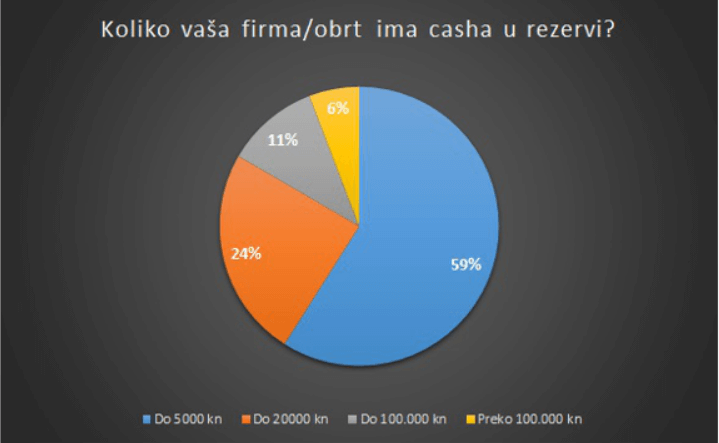
Aco Momcilovic, former HR of Rimac Automobili and now CEO of Future HR, wrote a piece on behalf on the Glas Poduzetnika group for TCN called In Media Res: The Voice of the Entrepreneur, in which he outlined the precarious state of many of Croatia's private enterprise. A survey of the group showed that 59% of businesses had cash reserves of 5,000 kuna or less (650 euro), and another 24% no more than 20,000 kuna (2,600 euro).
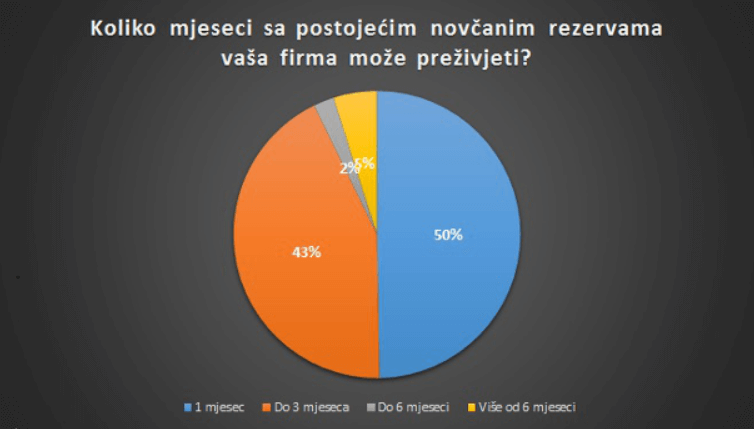
And 93% of companies said they could not last more than 3 months on existing reserves with this crisis, 50% no more than a month.
The response from the government prompted the group to write to Prime Minister Andrej Plenkovic, demanding the dismissal of Minister of Economy, Darko Horvat, and the immediate establishment of a Crisis Committee for the Economy. You can read their press release here - Croatia Faces 300,000 Layoffs in 3 Months: Voice of Entrepreneurs.
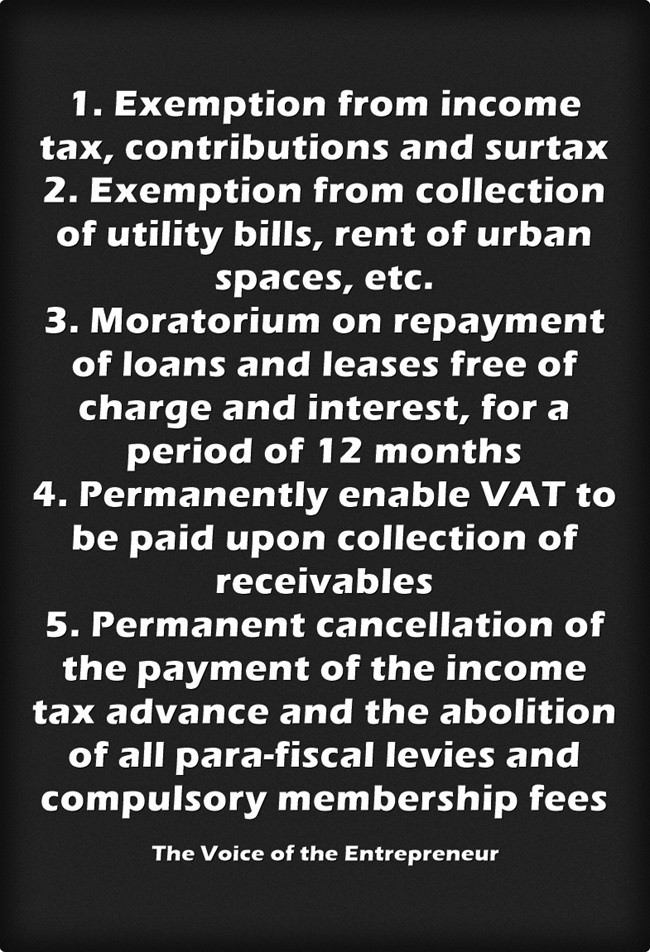
(5 Key Demands from Voice of Entrepreneurs)
My understanding is that members of the private sector met with Minister Horvat today, and there will be more information on that meeting tomorrow.
But the job losses have already started. And there is no better way of keeping the issue in the public eye than having a daily update on the job losses. Leading Croatian portal Index.hr has done just that, today adding an unemployment statistics counter (Nezaposleni) to the coronavirus numbers on its homepage.
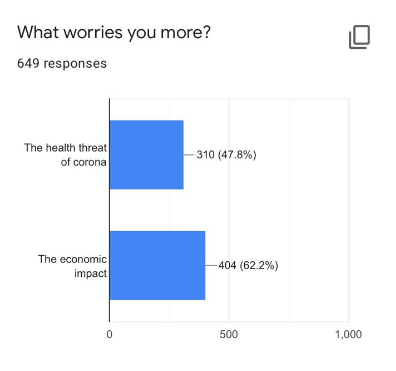
The economic fallout of this crisis is of equal concern to people here as the health threat, even more so according to one question in the first-ever TCN survey (you can see results to the other questions here).
As the authorities work tirelessly to flatten the COVID-19 curve, time will tell whether or not they will do the same for the unemployment statistics curve, but now both can be monitored side by side.
To follow the latest from the coronavirus crisis, check out the TCN dedicated section.
HUP Leader: Private Sector Will Again Bear Brunt of Crisis
ZAGREB, March 26, 2020 - The president of the Croatian Employers Association (HUP), Gordana Deranja, told Hina on Thursday that no one was to blame for the COVID-19 epidemic but that she was afraid that the private sector would again suffer the most.
"The situation is not pretty, we are plagued by uncertainty, the economy is in a difficult state and we do not have a clear vision of what will happen next. It is clear that neither the government nor any of us are to blame for the epidemic, but I am afraid that the private sector will once again pay the biggest price," Deranja said.
She added that in the economy everyone "is asking for write-offs, and not for deferral", since the situation was a catastrophe.
"HUP leadership regularly communicates with the government and ministries, it is in contact with its members, we have suggested a series of measures, and it is normal that the government does what it thinks should be done. Of course, we are not satisfied with the latest package of economic measures to help workers, entrepreneurs and the economy because we are asking for write-offs, not deferral," HUP president said.
She praised the national civil protection service and the healthcare system, as well as everyone taking care of the citizens' health and standing "on the front line of defence".
"None of us know if the crisis will last for a month or two or even longer. We do not know what tomorrow holds, but we do know that there are already many of those who cannot work, which means we do not have an income. If we do not have an income, we cannot pay people since we do not have a budget like the public sector, which we have been filling for years," Gordana Deranja said.
She said that this time the private sector stood together and would not let itself be completely destroyed.
"The economy is suffering all over Croatia. It is impossible to deliver materials, many demand advance payment, and orders have come to a halt. It is a disaster, it is nobody's fault, the whole world is in this together, but then we have to show solidarity, stay at home and respect the decisions. But then there we should also be eligible for write-offs and for exemption from tax and duty payments. Imagine, the Ministry of Tourism has generously relieved us of paying tourist board membership fees. Come on, what tourism are we talking about, this is ridiculous," Deranja said.
More coronavirus can be found in the Lifestyle section.

